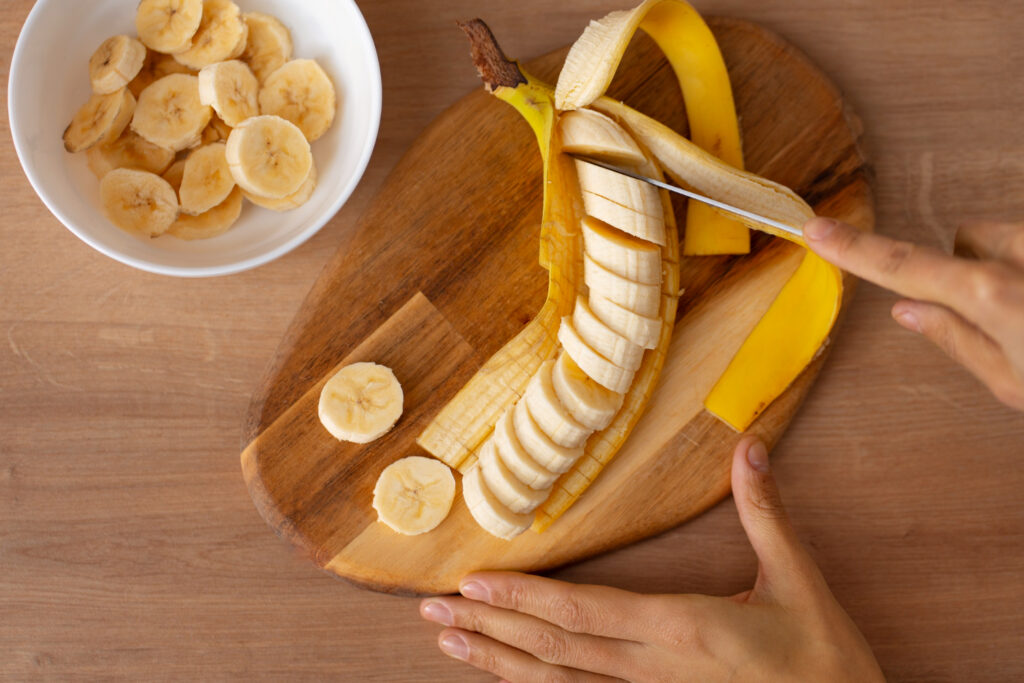
Fast Facts
Bananas are rich in potassium, magnesium, and vitamin B6
They help regulate heart health, digestion, and weight control
A medium banana has about 110 calories and 3 grams of fiber
Bananas have a low glycemic index, making them suitable for diabetics
Green bananas are a good source of resistant starch, which aids in digestion and weight loss.
Bananas grow from a tropical flowering plant and are known for their soft, sweet texture. They are a convenient source of important nutrients and have been cultivated since ancient times, originating in Southeast Asia. Today, bananas are grown in more than 150 countries in tropical climates, including regions in Africa, South and Central America, China, and India. There are hundreds of varieties, with the dessert banana (Cavendish) being the most popular in North America and Europe.
Bananas are versatile and tasty. They can be eaten raw, mixed into smoothies, or used in recipes like peanut butter-banana sandwiches, banana bread, and muffins. They are available year-round, easy to store, and travel well in their peel.
Is a Banana a Fruit?
Yes, a banana is considered a fruit. It grows in clusters at the top of a tropical plant.
Is a Banana a Berry?
Botanically speaking, a banana is a berry. Berries are fruits that come from one flower and usually contain several seeds.
Banana Benefits
Bananas are rich in potassium and other essential minerals and vitamins, contributing to various health benefits:
Heart Health
Bananas are well-known for their potassium content, crucial for heart health. This vital mineral and electrolyte help nerve cells send signals, ensuring regular heartbeats and muscle contractions. Potassium-rich foods help protect against atherosclerosis and high blood pressure. A medium banana provides about 450 milligrams of potassium, roughly 10% of the daily requirement. Potassium also aids in sodium excretion, relaxing blood vessel walls and lowering blood pressure.
Potassium benefits include:
- Lowering stroke risk
- Maintaining healthy bones as you age
- Improving muscle function
- Preventing kidney stones
If you have kidney problems, consult your doctor regarding potassium intake.
Digestive Health
Despite their sugar content, bananas have a low glycemic index (GI) value of 51, partly due to their fiber content. Bananas contain pectin, a type of fiber that controls carbohydrate digestion. They also have probiotics, which are good bacteria in your gut, and prebiotics, which feed these bacteria. Probiotics can help with antibiotic-associated diarrhea and may ease conditions like irritable bowel syndrome (IBS), lactose intolerance, and some allergy symptoms. They may also reduce the severity of colds and the flu
Bananas contain fructooligosaccharides (FOS), unique carbohydrates that maintain the balance of good bacteria in the lower intestine. Green bananas are a good source of resistant starch, which ferments in the large intestine, feeding good bacteria. Resistant starch can aid in weight loss, alleviate constipation, lower cholesterol, and reduce colon cancer risk.
Diabetes Management
A diet rich in low-GI foods may decrease diabetes complications. Bananas, despite having carbs, won’t disrupt a low-carb diet. A medium banana has about 27 grams of carbs, making it a suitable snack for diabetics.
Weight Control
Low-GI foods like bananas can promote weight loss. The fiber in bananas helps control weight by making you feel full without extra calories. An average-sized ripe banana provides 3 grams of fiber, about 10% of the daily requirement. Most of this fiber is soluble, which helps regulate cholesterol and blood pressure and ease inflammation.
Faster Workout Recovery
Research suggests that bananas may help with recovery from strenuous workouts, although more studies are needed to confirm this.
Cancer Prevention
One study found that children who regularly ate bananas and oranges, and drank orange juice, had a lower risk of childhood leukemia. Compounds in bananas show promise against various cancers, including breast, cervical, colorectal, esophageal, liver, oral, prostate, and skin cancers. However, more research is needed.
Memory and Mood Help
Bananas contain tryptophan, an amino acid that the body converts to serotonin, boosting mood. Other substances in bananas are known to combat cognitive decline and memory loss, with ongoing research exploring their potential for brain health.
Banana Nutrition
A medium banana provides about 110 calories and includes:
- 1 gram of protein
- 0 grams of fat
- 3 grams of fiber
- 15 grams of naturally occurring sugar
- 450 milligrams of potassium
How Many Carbs Are in a Banana?
A medium banana has about 28 grams of carbohydrate. The FDA recommends using total carbs rather than “net” carbs, as the latter isn’t scientifically accurate according to the American Diabetes Association.
Banana Nutrients
Bananas provide several vitamins and minerals, including:
- Vitamin B6: A medium banana gives about 25% of the daily B6 requirement, aiding metabolism, brain development, and immune system health.
- Magnesium: A banana provides 8% of the daily magnesium requirement, supporting blood pressure, blood sugar control, bone strength, and nerve and muscle function.
- Fiber: With about 3 grams per banana, fiber reduces colorectal cancer risk, lowers cholesterol, stabilizes blood sugar, and aids in weight maintenance.
- Vitamin C: A banana provides around 10 milligrams of vitamin C, helping protect against free radicals, supporting the immune system, and promoting healing.
- Vitamin A: Important for vision and potential cancer protection.
Are Organic Bananas Better?
Organic bananas are grown without synthetic pesticides or herbicides. While some believe they are more nutritious and better tasting, scientific research is limited. Both organic and conventionally grown bananas contain essential nutrients like vitamin B6 and tryptophan. Conventionally grown bananas have low to moderate pesticide residues, but some chemicals can penetrate the peel.
How to Eat Bananas
Bananas can be enjoyed raw or used in various recipes. They can substitute for eggs, butter, oil, or sweeteners in baked goods. Here are some ways to enjoy bananas:
- Adding sliced bananas to cereal
- Making dairy-free “nice cream” with frozen bananas
- Spreading nut butter on banana halves with toppings
- Mixing banana slices into pancake batter
- Freezing banana slices, dipping them in dark chocolate, and refreezing for a treat
- Using overripe bananas for banana bread
- Making bananas foster
- Blending frozen bananas into smoothies
How to Store Bananas
Store bananas away from direct sunlight. Yellow bananas can be kept in a sealed refrigerator drawer or on a banana hanger for even ripening. To ripen bananas quickly, place them in a paper bag or near ripe fruit. When the peel darkens, cut or mash the banana and freeze it for later use.
Takeaways
Bananas are a rich source of potassium, magnesium, vitamin B6, and other nutrients, benefiting digestive and heart health. They can be eaten raw or added to various recipes, making them a versatile and nutritious food choice.
A Quick Review
Bananas are a versatile and nutritious fruit packed with essential vitamins and minerals like potassium, magnesium, and vitamin B6. They are beneficial for heart health, digestion, and weight control. With a low glycemic index, bananas are suitable for diabetics. They also contain probiotics and prebiotics, promoting gut health. Whether eaten raw or used in recipes, bananas are a convenient and healthy choice for a balanced diet.











